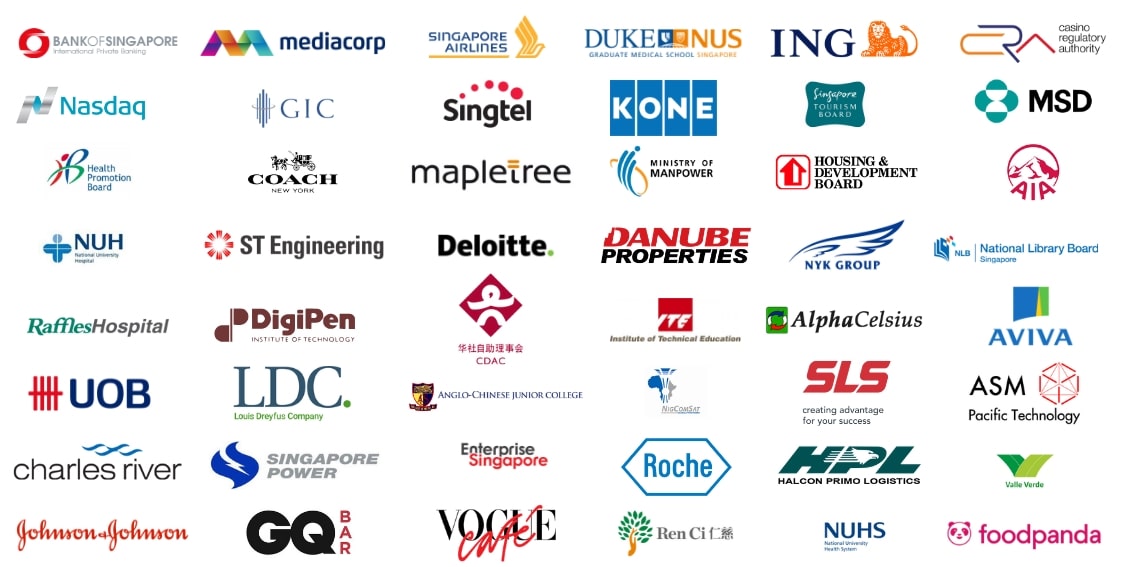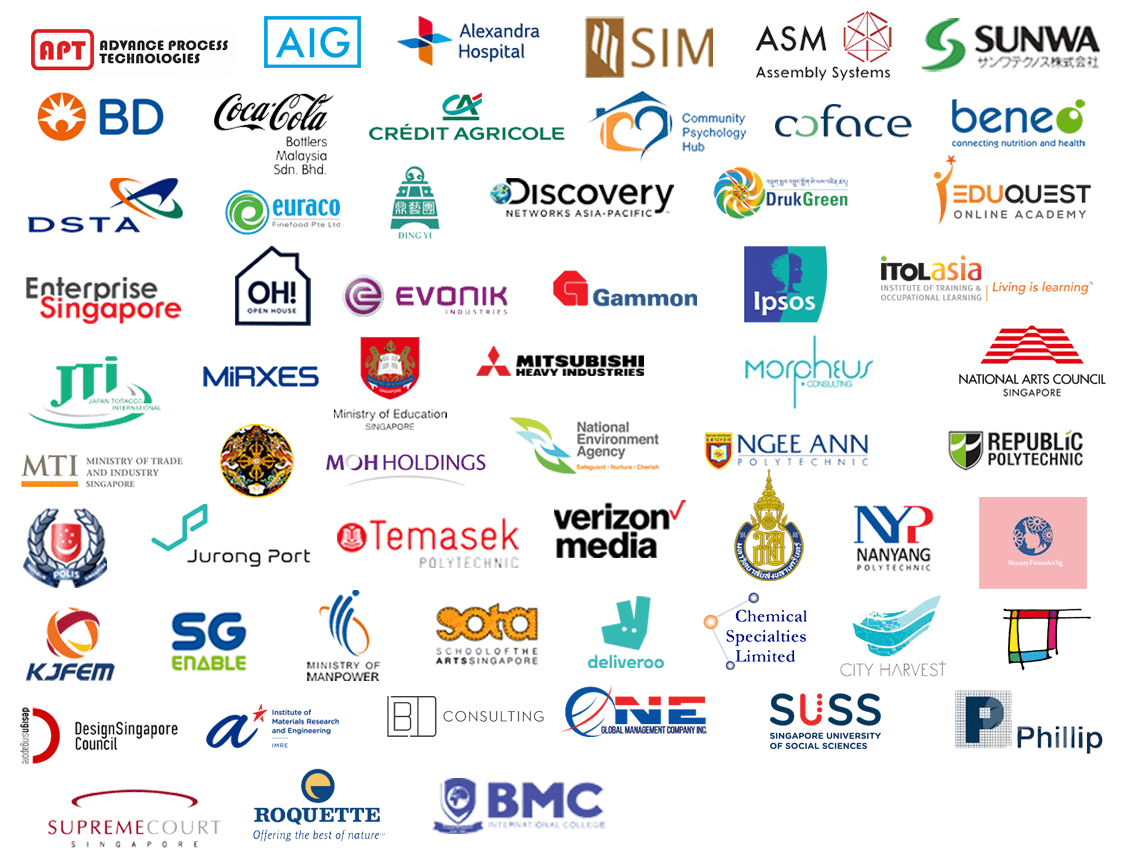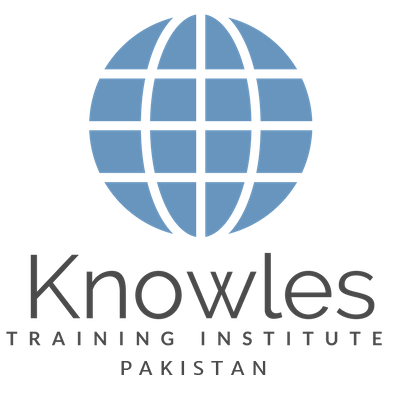Knowledge Management Training Course In Pakistan
Our corporate training course is also available in Karachi, Lahore, Faisalabad, Rawalpindi, Gujranwala, Peshawar, Multan, Hyderabad, Islamabad, Quetta, Sargodha, Bahawalpur, Sialkot, Sukkur, Larkana, Sheikhupura, Mirpur Khas, Rahim Yar Khan, Gujrat, Jhang, Mardan, Kasur, Dera Ghazi Khan, Nawabshah, Sahiwal, Mingora, Okara, Burewala, Jacobabad, Muzaffargarh, Murree, Hunza Valley, Swat Valley, Gilgit, Skardu, and Abbottabad.
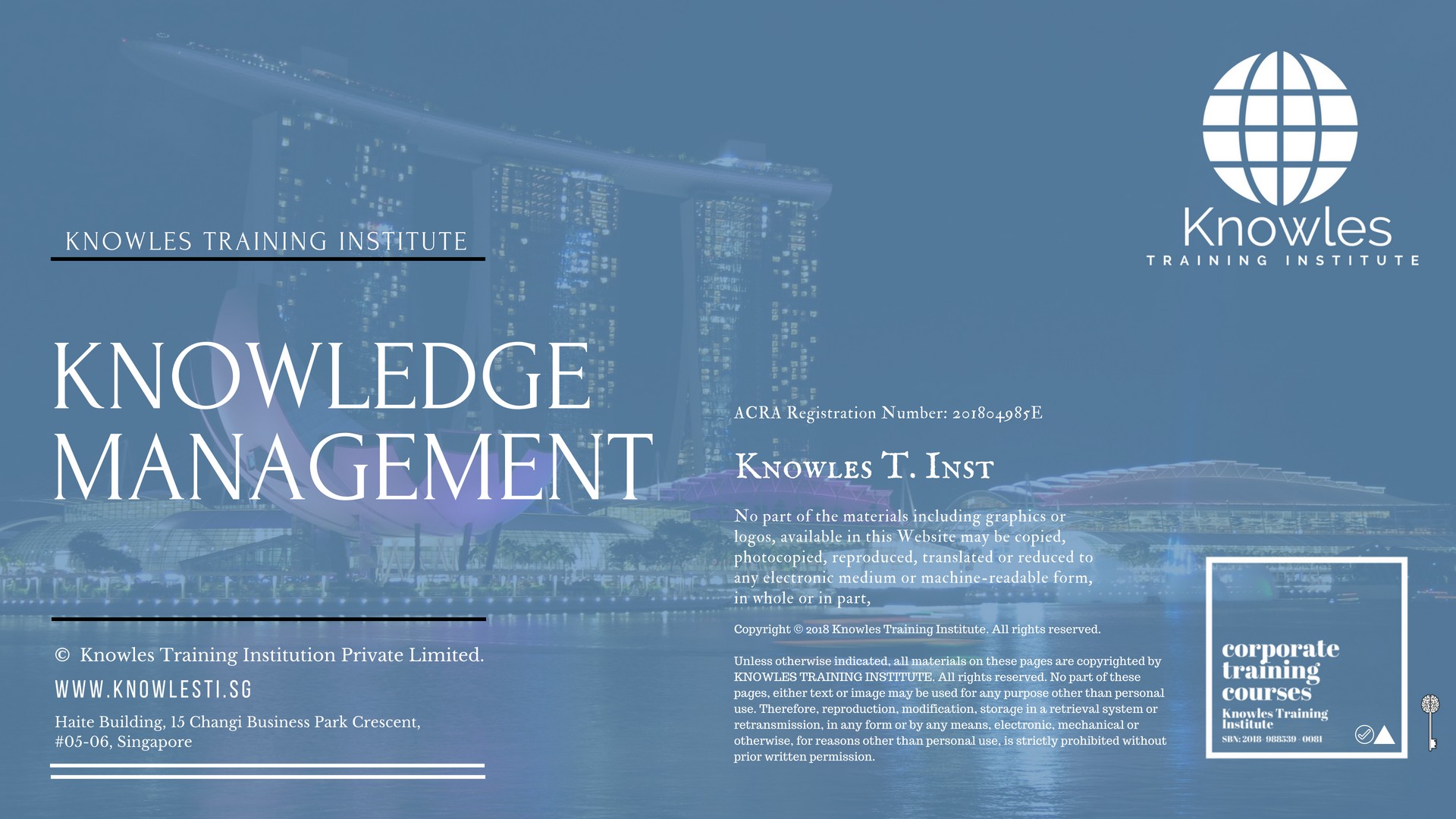
About This Knowledge Management Training Course in Pakistan
Knowledge Management Course in Pakistan
According to The Encarta Dictionary, it defines knowledge management as the organisation of intellectual resources and information systems in a business climate.
In this Knowledge Management course in Pakistan, participants will be given the tools that they will need to begin implementing knowledge management within your company, regardless of the size of the company or the budget. Wherever humans are working together for one goal, there is always knowledge to be harvested, stored, and dispensed as needed.
Knowledge is power and therefore must be regulated at the right time to the right people in the right way. In a company where knowledge needs to circulate in order for everyone to function properly, managing it is a priority. Managing knowledge involves choosing the right strategies for storage and dissemination.
Who Should Attend This Knowledge Management Course in Pakistan Workshop
This Knowledge Management course in Pakistan workshop is ideal for anyone who would like to gain a strong grasp and improve their Knowledge Management.
All Staff Within An Organisation
Managers
Team Leaders
Executives
Assistants
Officers
Secretaries
Group Size For This Knowledge Management Training Program in Pakistan
The ideal group size for this Knowledge Management course in Pakistan is:
Minimum: 5 Participants
Maximum: 15 Participants
Course Duration For This Knowledge Management Skills Course in Pakistan
The duration of this Knowledge Management course in Pakistan workshop is 2 full days. Knowles Training Institute Pakistan will also be able to contextualised this workshop according to different durations; 3 full days, 1 day, half day, 90 minutes and 60 minutes.
2 Full Days
9 a.m to 5 p.m
Knowledge Management Course in Pakistan Benefits
Below is the list of course benefits of our Knowledge Management course in Pakistan
- Apply knowledge management of Information and Content Governance at the workplace.
- Incorporate data and information for increased focus on outcomes of business activities.
- Incorporate knowledge management about employees to improve workforce behaviors.
- Gain insight on the benefits of reusing ideas, documents, and expertise.
- Employ processing of information tactics to put business needs first.
- Incorporate research in business systems and processes to gain more explicit knowledge on the business.
- Employ systematic knowledge management process into specified team roles.
- Engage maximum use of existing expertise and experience in executing knowledge management tasks at the workplace.
- Apply skills gained on knowledge management to develop top-down knowledge support structures in the organization.
- Utilize the systems and tools of knowledge management thus optimize use of organizational technology investments.
- Apply knowledge transfer skills to enable better and faster decision making at work.
- Employ clear and defined knowledge management processes to ease finding of relevant information and resources.
- Incorporate a knowledge sharing culture in the organization to improve communicating of important information widely and quickly.
- Gain insights on the benefits of managing information to promote standard, repeatable processes and procedures.
- Use knowledge gained to provide methods, tools, templates, techniques, and examples of knowledge management.
- Information research makes scarce expertise widely available for organizations.
- Encourage knowledge transfer and sharing at the workplace to stimulate innovation and growth.
Knowledge Management Course in Pakistan Objectives
Below is the list of course objectives of our Knowledge Management course in Pakistan
- Understand The Basic Concept Of Knowledge Management (KM)
- Identify The Do’s And Don’ts Of Knowledge Management
- Identify The Knowledge Management Life Cycle
- Identify The New Knowledge Management Paradigm
- Identify The Knowledge Management Models
- Understand How To Build A Knowledge Management Rational For Your Company
- Understand How To Customize Knowledge Management Definitions
- Identify The Steps To Implementing Knowledge Management In Your Organisation
- Identify Tips For Success
- Understand The Advance Topics In Knowledge Management
Course Content For This Knowledge Management Training Course in Pakistan
Below is the list of course content of our Knowledge Management training programme course in Pakistan
Knowledge Management Course in Pakistan – Part I
- Understanding Knowledge Management
- The words knowledge and management are two extremely broad concepts when separated. When the two words come together, it addresses a concept that strives to organize information in a way that provides an advantage for an organisation.
- What is Knowledge?
- The word knowledge is frequently confused for information or data. The online version of the Merriam-Webster dictionary explains knowledge as the following: Fact or condition of knowing something with familiarity gained through experience or association.
- What is Knowledge Management?
- Knowledge management is a plan or system intended to create, capture, share and support knowledge towards the success of the company. This is easier said than done because launching a knowledge management program entails many changes and support at all levels of the company.
- A Brief History of Knowledge Management
- The roots of knowledge management can be traced back to the late 1970s. Everett Rogers and Thomas Allen’s set the foundation to the theory of how knowledge is created, implemented, and integrated throughout a company.
- Applications of Knowledge Management in the Workplace
- Knowledge management can be implemented in many sectors of the company. Remember that knowledge management is not only collecting knowledge. The more extensive focus is on sharing. With this in mind, implementing knowledge management in the workplace is almost unlimited
Knowledge Management Course in Pakistan – Part II
- The Dos & Don’ts of Knowledge Management
- There are several ways to implement knowledge management. The information accessible to you may be overwhelming. Understanding the kinds of knowledge and places to obtain it will reduce errors and improve efficiency in implementing a knowledge management project.
- Understanding Data, Information, and Knowledge
- Data is bits of content in either text or numerical format. On itself, data has no meaning. Information is data that is collected to allow comparison, grouping, and classifying which enables the content viewer to decide what to do with the data group. Knowledge is using the information and placing context around it, making it actionable.
- The Tacit Mode
- Tacit knowledge is the knowledge that is not documented. It is transferred silently through behaviours and experience.
- The Explicit Mode
- Explicit knowledge is more straightforward to identify and document. It is clearly communicated, written down, transferred, stored and retrieved.
- Identifying Conversion Categories
- Conversion categories are areas where knowledge is converted or replaced. The most helpful way to think of these conversion categories is using the tacit and explicit methods for both the type of knowledge and the type of behavior.
Knowledge Management Course in Pakistan – Part III
- The Knowledge Management Life Cycle
- Knowledge management is a cycle of recognising information that may or may not be valuable knowledge, formatting it into usable knowledge, and integrating it into a company.
- Episodes of Knowledge Transfer
- Episodes of knowledge transfer occur in many forms. Understanding that anytime a problem is realised or a new venture on the horizon, there is a great possibility that there is knowledge to seize.
- The Acquisition Stage
- The acquiring stage attempts to collect information from both internal and external sources. It addresses tacit and explicit methods of knowledge and includes many ways.
- Knowledge
- Knowledge is information that is placed in context so that it becomes actionable. For this to happen, knowledge must be assessed against business goals and plans. The knowledge that is considered useful for the company passes on through to the next cycle and blended.
- Making Knowledge Known Through Inegration
- Integration is making knowledge known. There are various general methods for getting knowledge out throughout the company.
Knowledge Management Course in Pakistan – Part IV
- The New Knowledge Management Paradigm
- With the advent of information technology, knowledge management has grown into a technologically based program.
- Paradigms of the Past
- Knowledge management does have a past and there are models out there that rely on knowledge acquisition and storage as the design for a knowledge management policy.
- The New Paradigm
- The new paradigm for knowledge management is largely different from the past. Instead of concentrating on data storage and retrieval, the focus is on connections and networks including employees.
- Implications and Applications
- As you examine the introduction of knowledge management to your company, you should acknowledge the implications that applying knowledge management brings.
- The Knowledge Management Endgame
- The most important information you should convey about knowledge management is what it will do for the company.
Knowledge Management Course in Pakistan – Part V
- Knowledge Management Models
- We are investigating the origins and core principles of knowledge management in this section. Some models have influenced knowledge management considerably over the years and these are worth understanding.
- The Nonaka and Takeuchi Model (SECI)
- Ikujiro Nonaka and Hirotaka Takeuchi model of knowledge creation depicts a spiralling process of tacit knowledge and explicit knowledge.
- Wiig knowledge management Model
- Karl Wiig focused on 6 strategies to organisational knowledge management processs; Knowledge management as a business strategy, Managing intellectual assets strategy, Personal knowledge asset responsibility strategy, Knowledge creation strategy, Knowledge transfer strategy, Customer-focused knowledge strategy
- Kakabadse knowledge management Model
- Kakabadse identified 5 models for knowledge management; Philosophy based model, Cognitive model, Network model, Community of practice model and finally the Quantum model.
- Boisot knowledge management Model
- Boisot defines a knowledge management model that is three-dimensional. His Information Space or I-Space philosophy outlines three axes.
Knowledge Management Course in Pakistan – Part VI
- Building a Knowledge Management Rationale
- Any projects must have a purpose for its existence. Implementing a knowledge management plan is no different. A great rationale for implementing knowledge management will help inspire those that control budgets to see the value of funding your project.
- Why Rationale is Necessary
- Only saying the company needs knowledge management is not going to get you the assistance you need to implement your knowledge management project. You will need a rationale or reason for implementing knowledge management.
- Building a Business Case
- A business case describes the business reasons that explain implementing knowledge management.
- Finding Success Stories
- Including success stories into your knowledge management case will help to show the value through an objective source.
- The Commodisation/Customisation Model
- Knowledge management is not a one-size-fits-all plan. Your company does not want to be pitched with a generic knowledge management program.
Knowledge Management Course in Pakistan – Part VII
- Customizing Knowledge Management Definitions
- At this point, you want to customise what knowledge management will look like within your company. This is necessary because your project stakeholders would like to know what you are trying to achieve.
- Components of a Knowledge Management Definition
- Having a solid foundation in project management will assist you to define your project and communicate clearly to your stakeholders.
- Customising the Components
- To customise your knowledge management program to fit the company, you will have to involve the company.
- Creating a KMBOK
- A knowledge management body of knowledge or KMBOK is an enterprise-wide program that achieves all knowledge within the company. The actual knowledge management system manages all major areas of knowledge within the company.
Knowledge Management Course in Pakistan – Part VIII
- Implementing Knowledge Management in Your Organization
- Now you are equipped to put together your project plan. Like in any other project, there is a level of support both politically and financially. The more prepared and detailed your plan is, your odds of support increases.
- Gathering Support
- It is always best to obtain support from a senior level or executive manager. You may be able to begin a grassroots campaign for your knowledge management project, but without the appropriate level of support from senior management, you may find yourself fighting an uphill struggle.
- Identifying Opportunities for Revenue Streams
- The best chances of obtaining funding for your projects rely heavily on how well you present the budget.
- Key Knowledge Management Techniques
- There are various knowledge management techniques. We are going to learn several according to each of the major phases of the knowledge management cycle
- A Map for Success for Knowledge Management
- A successful rollout of a knowledge management project involves vision, timeline, strong leadership, strategy, internal marketing.
- The No-Budget Scenario
- Some companies may run into a no-budget situation with their knowledge management project, however, there are still some economical ways to implement a knowledge management program within an organisation.
Knowledge Management Course in Pakistan – Part IX
- Tips for Success
- You need all the cooperation you can get when trying to produce a change as great as the one involved with executing knowledge management within your company.
- About the Chief Knowledge Officer
- If an organisation is serious about knowledge management, they may approve the idea of a Chief Knowledge Officer. The Chief Knowledge Officer will keep knowledge management at the forefront of the business. They are in touch with business strategies on a day-to-day basis.
- Knowledge Management Skill Checklist
- There are certain skills that an individual or a team must posses to manage a knowledge management project.
- The Knowledge Management Imperative
- Introducing a plan or strategy without energy or reason for a change may get a project on the stove though on the backburner. There must be a sound level of urgency in getting any project started.
- The Hype Curve of Knowledge Management
- The hype cycle consists of 5 phases and understanding the 5 phases will help the organisation to manage the unrealistic peaks and the depths of the trough.
- Barriers and Helpers to Success
- The most significant challenge you will face is the culture. If the organisation’s culture is open to change and embrace learning and sharing this will help move the project along. On the other hand, if the organisation’s culture is closed and defiant to change, the company will find it challenging to implement the project.
Knowledge Management Course in Pakistan – Part X
- The Knowledge Management Maturity Model
- The knowledge management maturity model has 5 levels; Initial, respectable, defined, managed, optimising.
- Absorptive Capacity
- The absorptive capacity is the company’s ability to identify the value of new knowledge, integrate it, and apply it in a way that forms competitive advantage.
- Rustiness
- There are multiple numbers of techniques to keep a knowledge management project vibrant and relevant over time.
- Process Model Types
- A process model explains how a process should be done. It outlines what the process looks like. It is normally an illustration, which conveys the actions, relationships, and goals of finishing a process. Using a process model will help to make the process more significant to an organisation.
Knowledge Management Course in Pakistan Value Added Materials
Each participant will receive the following materials for the Knowledge Management course in Pakistan
Knowledge Management Course in Pakistan Learner’s Guide
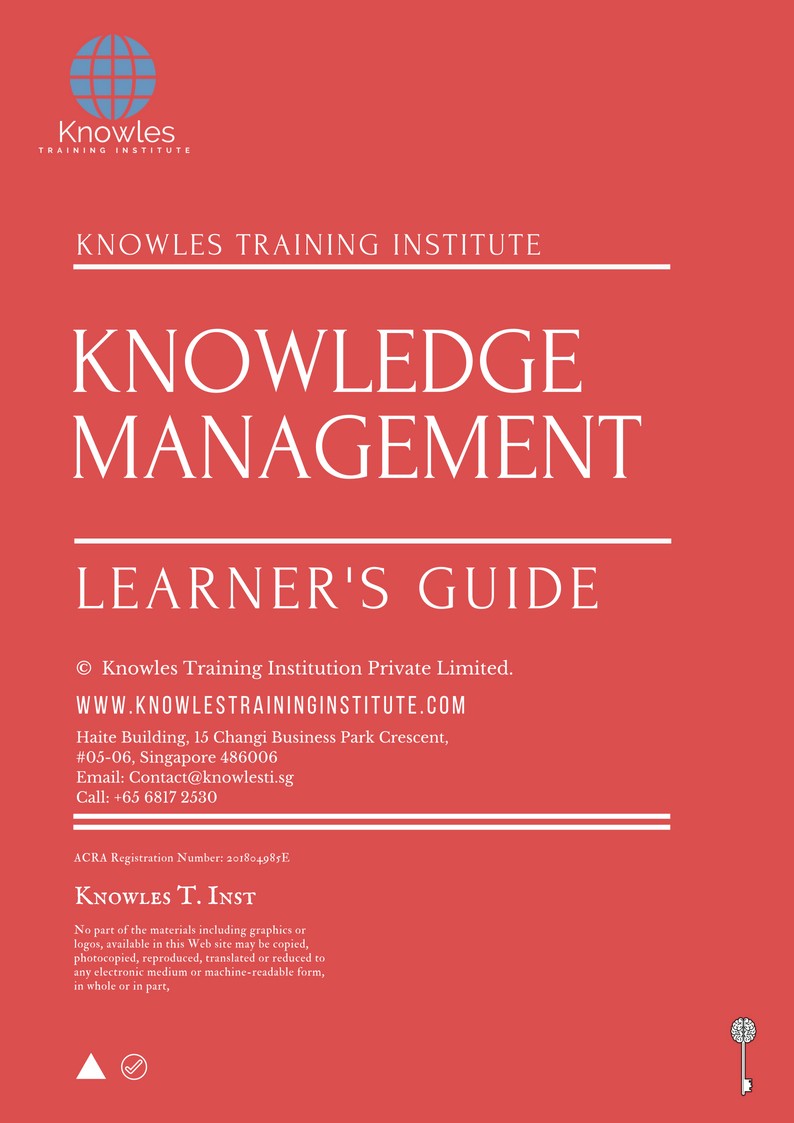
Knowledge Management Course in Pakistan Handouts
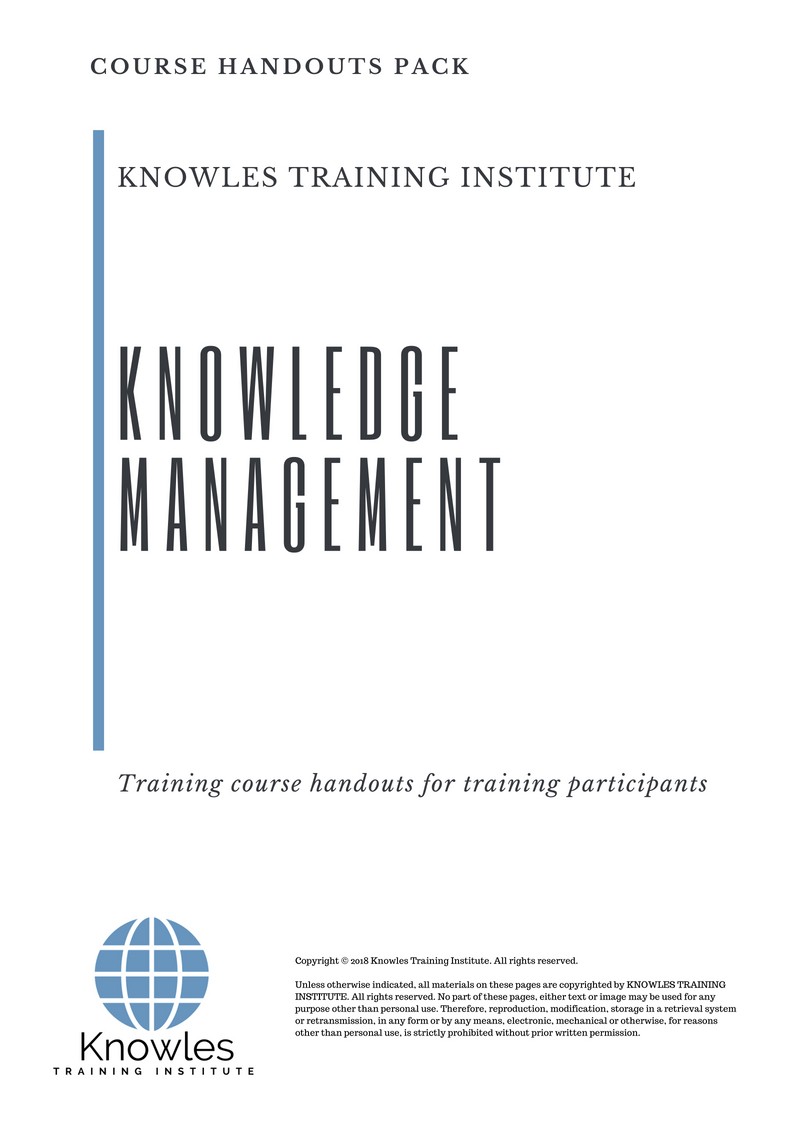
Knowledge Management Course in Pakistan PPT Slides Used During Course
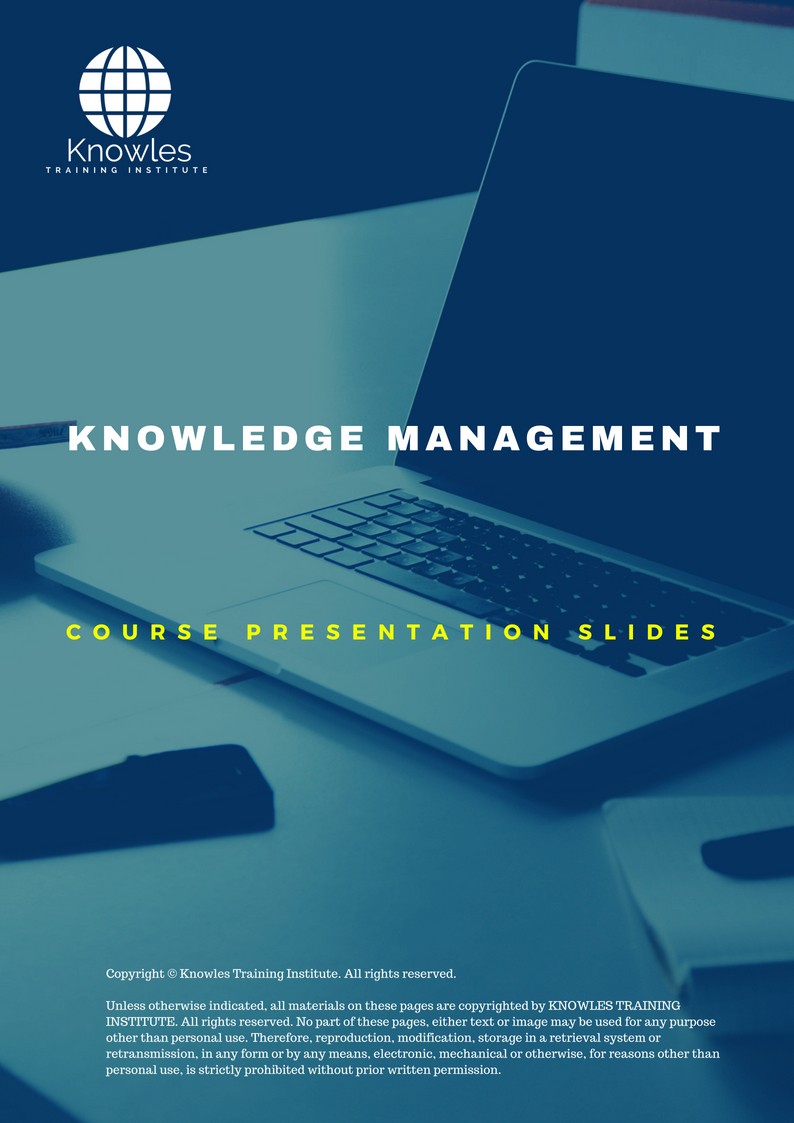
Knowledge Management Course in Pakistan Certification
Each course participant will receive a certification of training completion
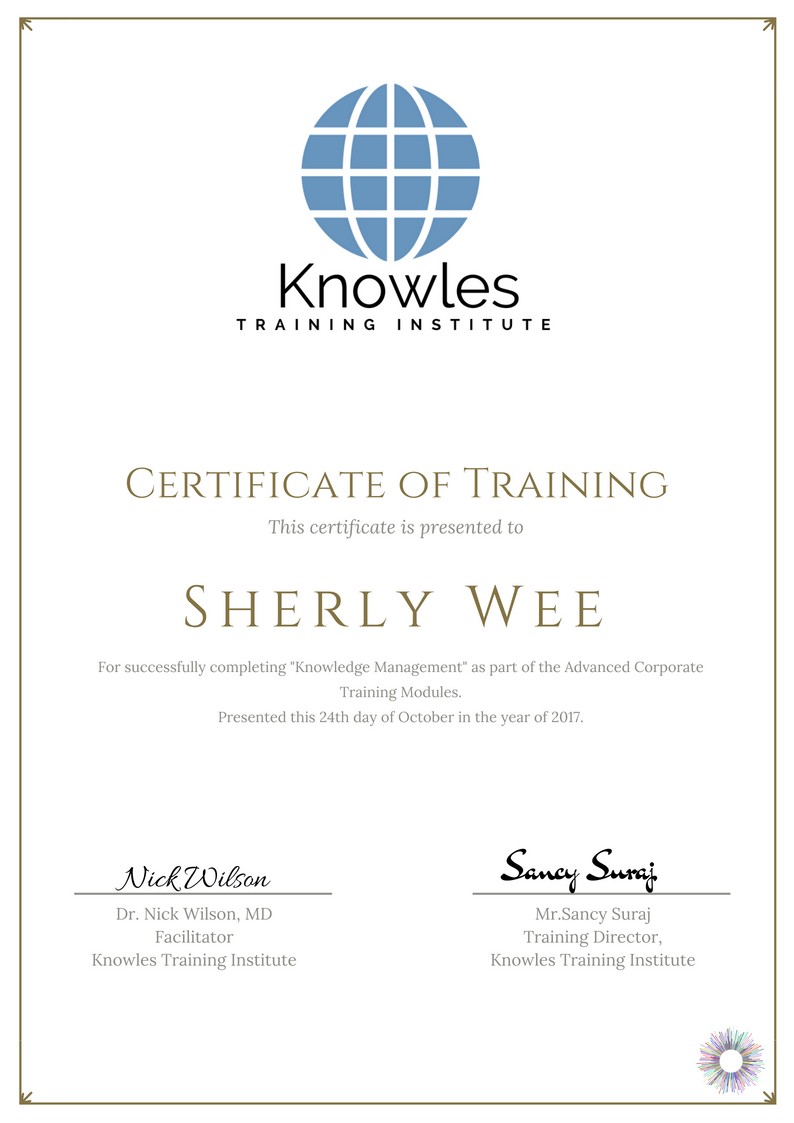
Course Fees For Knowledge Management Training Course In Pakistan
There are 4 pricing options available for this Knowledge Management training course in Pakistan. Course participants not in Pakistan may choose to sign up for our online Knowledge Management training course in Pakistan.
- USD 1,019.96 For a 60-minute Lunch Talk Session.
- USD 434.96 For a Half Day Course Per Participant.
- USD 659.96 For a 1 Day Course Per Participant.
- USD 884.96 For a 2 Day Course Per Participant.
Discounts available for more than 2 participants.
Upcoming Knowledge Management Training Course in Pakistan Schedule
Contact us for the latest Knowledge Management course in Pakistan schedules:
Email: contact@knowlesti.pk
Message:
Download Knowledge Management Course in Pakistan Brochure
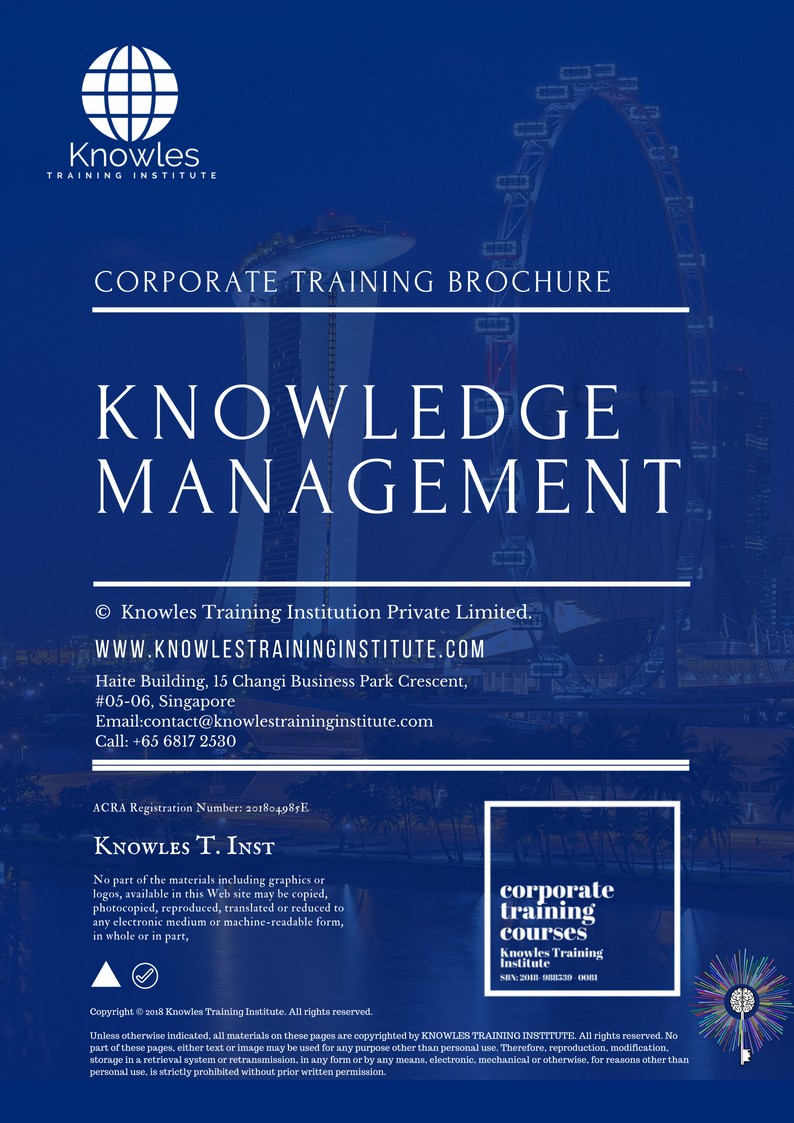
Request for this Knowledge Management course in Pakistan brochure. Fill up the short information below and we will send it to you right away!
Post Training Support: A vast majority of training does not have any effect beyond 120 days. To work, training has to have a strong pre- and post-training component. Post-training reinforcement helps individuals to recall the understanding and ask questions.
Blended Learning: Learning does not occur in the classroom. Virtually everybody prefers distinct ways of learning. Successful learning should have a multi-channel, multi-modal strategy.
- We Understand The Industry: We’ve got a profound comprehension of the business, business design, challenges, strategy and the that our participants are in and have designed the courseware to cater to their professional needs.
- Course Content: Knowles Training Institute’s material is relevant, of high quality and provide specific learning results. Participants will leave the training course feeling as they have gained a strong understanding and will also be in a position to execute what they have learned sensibly.
Course Development — The workshop modules follow a systematic and logical arrangement. This structure helps to ensure that the course material allows the facilitators to deliver the course in a logical arrangement. Consider the subjects as building bricks into learning, our facilitators slowly build towards a comprehensive picture of this entire topic.
